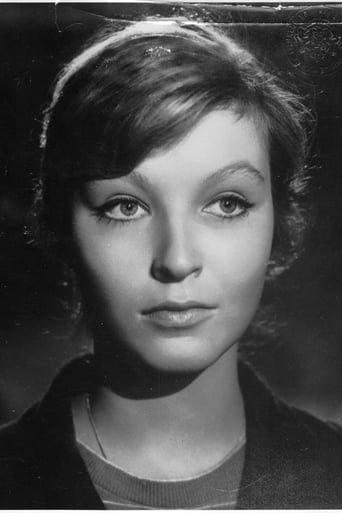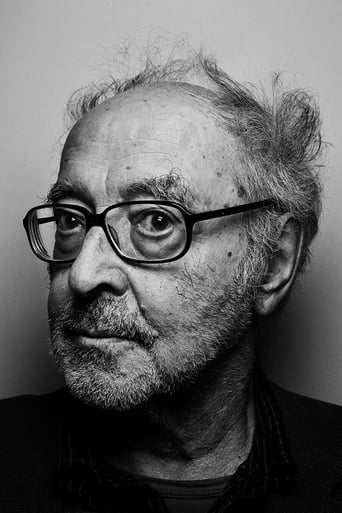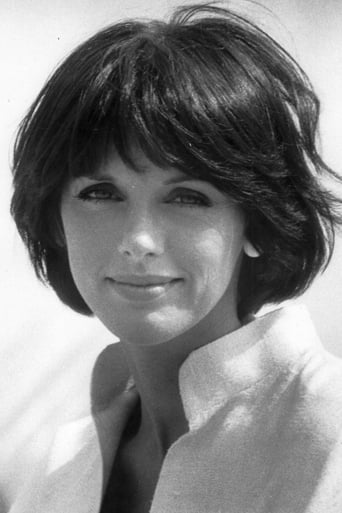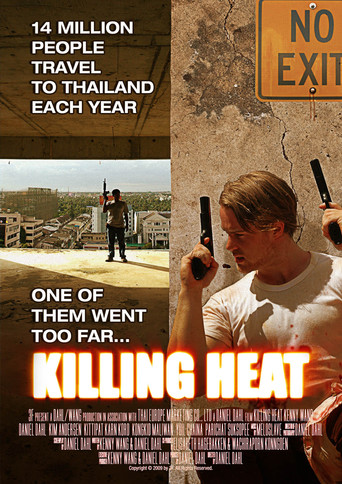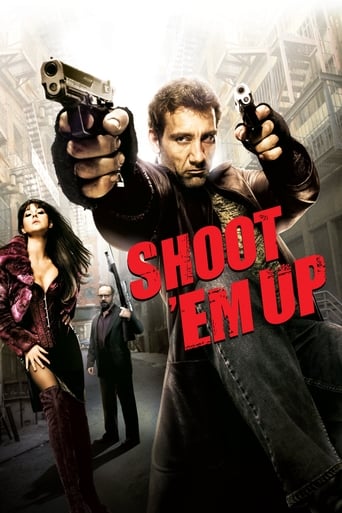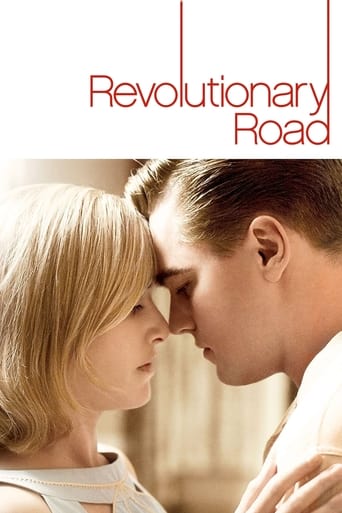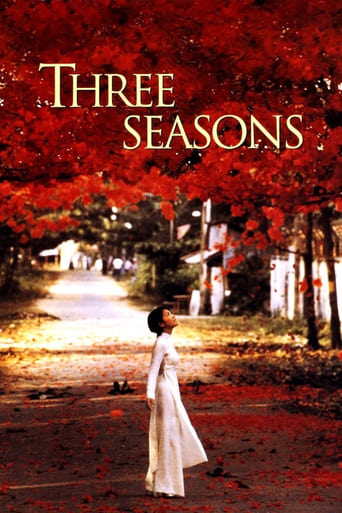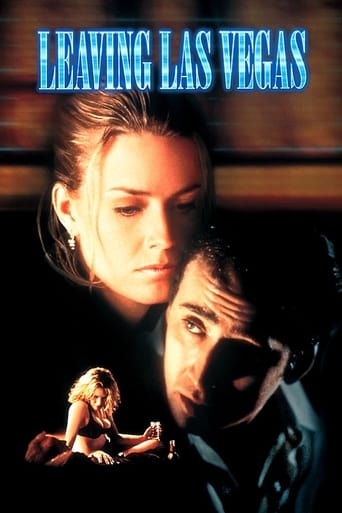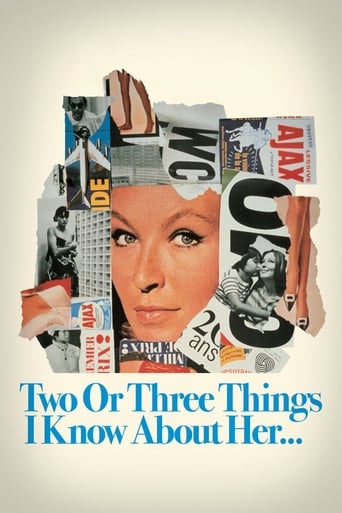
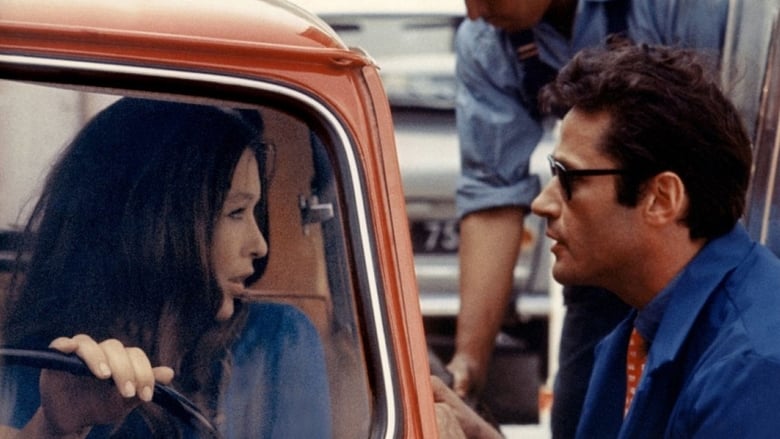
2 or 3 Things I Know About Her (1970)
As the city of Paris and the French people grow in consumer culture, a housewife living in a high-rise apartment with her husband and two children takes to prostitution to help pay the bills.
Watch Trailer
Cast


Similar titles
Reviews
Jean-Luc Godard is a master of making nonsense turn into something interesting, something of deep meaning. 2 or 3 Things I Know About Her is full of grand ideas, jumbled up no less, and in return they make a sometimes compelling and sometimes frustrating film. Godard famously once said that the film was supposed to be an homage to The Big Sleep, but instead of a detective, the main character is a prostitute. But if 2 or 3 Things I Know About Her is an homage to The Big Sleep, then I must be a zebra. Frankly, no matter what Godard tries to tell us beforehand, this is a challenging film that has moments of great intellect and inspiration.The "her" in the title refers both to Marina Vlady and the city of Paris itself. Vlady "portrays" Juliette Janson, a bourgeois housewife that doubles as a prostitute in order to pay the bills. "Portrayal" has quote marks around it as Juliette is less of a character and more of a representation: Godard does not intend to tell the story of the complicated woman — he would prefer to study the changing climate of 1960s Paris and its people. 2 or 3 Things I Know About Her marks a huge shift in Godard's career. A staggering fan of American cinema, his earlier projects, such as Pierrot Le Fou and A Woman Is A Woman, were genre films that were stylized as crime thrillers and Technicolor musicals, respectively. But 2 or 3 Things shows Godard more interested in politics and how the increasingly radical ideas of the world were shaping Europe. There are still very American things that show up in certain scenes: in the opening credits, the font is dressed in red, white, and blue. In the rest of the film, advertisements that surround the characters are designed with art deco boldness. But it's difficult to compare the film to anything the U.S. had to offer in cinemas in 1967.2 or 3 Things I Know About Her feels like a delve into Godard's brain at the time. The Vietnam War is mentioned frequently, serving not only as a point of critique but also as a pressing matter, always on the mind. Juliette's immoral lifestyle choice is not a plot device, but a reflection of 1967 France: President Charles de Gaulle's bold transformations to the economic system are prevalent. Skyscrapers are gazed upon with an alienated distance, and Juliette's work was an actual choice many women had to make as cost of living began to increase under his rule.Godard's positions are fascinating, but at times they begin to ramble and become disjointed in their aesthetic. 2 or 3 Things I Know About Her is at its most exciting when characters are simply having normal conversations. When they deliver fourth-wall breaking monologues, they lose quite a bit of their charisma as they feel as though Godard is talking to himself. Too much Godard can be too much Godard, after all.2 or 3 Things I Know About Her features more successes than failures; it's a film that doesn't have much emotional relevance but manages to create interest on a philosophical level. Godard had a great '60s, and this is a fitting closing.Read more reviews at petersonreviews.com
Directed by Jean-Luc Godard (À Bout De Soufflé (Breathless), Alphaville, Pierrot Le Fou), I wanted to watch this French film purely because it featured in the book 1001 Movies You Must See Before You Die, I never would have heard of it before reading about it. Basically this film does not tell a story, it is more a study of modern life, with almost everything you can think of put in, according to the director, sports, politics, even groceries, Godard narrates himself in a whispered voice. There is no conventional cinematic narrative, it sees one day in the life of Juliette Jeanson (Marina Vlady), her life is sophisticated but empty, she is a married mother but involves herself in prostitution, and after dropping off her screaming child her day is uneventful with the usual daily routine, shopping, housework and child-rearing, and appointments with clients, seen as banal rather than erotic. Also starring Anny Duperey as Marianne, Roger Montsoret as Robert Jeanson, Jean Narboni as Roger, Christophe Bourseiller as Christophe Jeanson, Marie Bourseiller as Solange Jeanson, Raoul Lévy as John Bogus, the American, Joseph Gehrard as Monsieur Gérard and Juliet Berto as Girl talking to Robert. The performance of Vlady obviously keeps whatever is going on flowing, but in fact the real "her" of the title is Paris, with all the images seen and sounds heard it combines to form a most interesting sociological essay, I agree it is somewhat dated, but is indeed still daring and a mostly splendid experimental drama. Good!
This is a film collage, or experimental film, about the state of Paris as Godard sees it in 1967. The old, romantic Paris is reshaped, large suburbs of tower blocks are built, which Godard correctly predicted to be soulless and inhuman to some degree. The film loosely follows the life of a young housewife and depicts her consumerist lifestyle, which Godard likens to prostitution. At one point she and her manicurist prostitute themselves to a US-American, who wears a stars-and-stripes-T-shirt and makes the girls wear bags over their head. The narrative is so weak that I had to look it up on the internet. Unfortunately, Godard doesn't limit himself to depicting the state of life in 1967, which could have made a fascinating cinematic time capsule. In a way, he seems to be p*ssed off with the state of things in general. Les banlieues -- bad. Vietnam war -- bad. Bright boxes of soap powder -- bad. Cinematic conventions and storytelling -- bad. It's like watching the rant of a miserable old man. I thought the analogy between capitalism and prostitution was pretty cheap. Prefab tower blocks were going up in the Eastern bloc like mushrooms. What alternative does he have to offer? Is he just hankering for the old days of "gay Paree"? As if prostitution hadn't existed back then. In a way, he's part of the parcel. People in 1967 were moving into high-rise slabs, surrounded themselves with bright plastic, and had to endure soulless movies like this one.Yet I'm not angry with Godard. He tried new stuff in this movie, and wasn't very successful with it. I'm angry with film critics who make this out to be a cinematic masterpiece merely because it's "political".
Godard is a God ard. Some people find his films easy. Some find his films hard, Godard is a cinema BardWith "Breathless," Godard created new wave cinema in 1960. With this movie, Godard created postmodern cinema. The amazing thing is how much this film captures a moment in time and space. In fact, in one scene, we are told that it is being filmed on August 17, 1966. We can say that this the date when the Postmodernist world was born.One has to see it as a transition from Pop Art to Postmodernist art. Part of the film is obsessed with the artistic nature of household products. Part of the film is a meditation on our lack of being and our amazing relationship to language.Godard's treatment of woman is quaintly pre-feminist. He is treating them as sex objects,yet at one moment he asks a woman to speak about the sex between her legs. The woman rebukes her and tells her its stupid. Another astonishing moment in a film that has many.The film is non-narrative for the most part. It is Brechtian theater translated into cinema. Godard proves that non-narrative cinema can provide a great deal of pleasure, foreshadowing the future - present cinema.Godard is a God ard.


